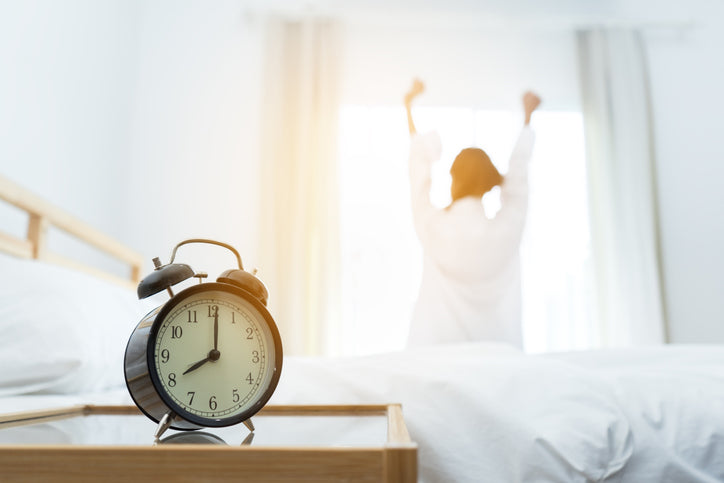
6 Ways to Get the Best Night’s Sleep You’ve Ever Had
I know we hear people talk all the time about the importance of self-care — and they’re right! If you don’t take care of yourself, nobody else is going to, and your body is going to suffer for it.
In fact, I already have a blog post all about burnout and how to tell if you’re experiencing it, as well as one on how important it is to care for your skin inside and out — both of which are essential self-care practices.
But do you know one of the most important self-care musts? The one that is non-negotiable and actually required by our bodies to keep us going?
Getting enough sleep.
You could do everything right, {{customer.first_name}} — clean diet, skincare, exercise. But there’s nothing out there that will make you look and feel as good as good, quality sleep!
This is because your body goes into “rest and repair mode” overnight. It removes toxins, repairs cell and DNA damage, replaces aging cells, and then creates new ones.
That’s why if you don’t get the full 6-8 hours of good-quality sleep your body needs, it will show on your skin — and around your waist.
So, if you want to look smooth and youthful, and feel well-rested and energized every morning, then sleep MUST be a priority.
And I know it can be tricky to transition from a busy day to a peaceful night, so here’s the perfect nighttime routine to help you wind down:
Set a Regular Bedtime
Try to turn in at the same time each night and wake up at the same time each morning.
We all have an internal clock that knows exactly when we should be asleep or wide awake, so it’s important to pay attention when your body says that it’s time for bed, or you will wake up feeling unrested.
Sometimes it’s fine to stay up a little later on the weekends, but be sure to try and sleep in a little later, too.
If you need a hand “resetting” your biological clock, spend some extra time in the sun. Even just 30 to 45 minutes of direct sunlight may balance out your circadian rhythm.
Going on a brief walk not only helps you achieve this goal, but the exercise aspect is just another tool that will help you sleep better at night — just be sure to wear eye protection and sunscreen if you plan to be in the sun longer than 15 minutes.
Turn Off Devices at Least 2 Hours Before Bed
Did you know the blue light coming from your TV, smartphone, or computer can alter your melatonin levels, making your brain think it’s still daytime?
So be sure to close the laptop, turn off the TV, and put your phone to bed at least 1 to 2 hours before you go to sleep. I find it helpful to read a few pages of a book, listen to a podcast, or pack tomorrow’s lunch during this time.
Setting your phone to airplane mode or turning on “do not disturb” until the morning can help you fight the urge to pick it up at every ding. Some people see even further success putting their phone in a separate room than the one they sleep in. But if you just can’t bring yourself to turn off your devices cold turkey, at least invest in some blue-light-blocking glasses.
Keep the Room Dark
Not only can artificial light keep you awake, but natural light can, too. Black-out curtains are a great investment for blocking out streetlights, porch lights, and that morning sun when you’re trying to sleep in.
If you work overnight and have to sleep during the day, I cannot stress the importance of this tip. You’re not only fighting against your body’s circadian rhythm (which is telling you to stay awake), but you’re also dealing with the brightest part of the day.
Plus, a heavy set of curtains can stop your room from heating up during the day, which leads to my next tip…
Set the Temperature to at least 67°F
Our body temperature changes constantly throughout the day.
But your body likes to cool down around nighttime to signal it’s time for bed.
So the cooler your body temperature, the more relaxed you become, and the more well-rested you’ll feel in the morning.
If you need it even cooler, try out these tips for regulating your temperature at night:
- Use a fan or in-room air conditioning unit. These also double as white noise to drown out passing cars or snoring partners.
- Open the windows for ventilation (this works best if you have a screen and sleep above the ground floor).
- Reduce the humidity with a dehumidifier.
- Opt for breathable linens and loose-fitting pajamas, and remember to change out your bedding with the season or on a schedule that works for your lifestyle.
Stop Eating 3 Hours Before Bed
Now, this goes back to lowering your body temperature and letting your body focus on resting rather than digestion.
When you eat before bed, your body is focused on digesting the food you just ate instead of powering down for the night. Not to mention, laying down after a heavy meal increases your chances of digestive issues, like acid reflux and indigestion, which will certainly keep you up.
The same goes with water — you don’t want to keep waking up throughout the night, after all.
Take Magnesium or Melatonin
A little dose of either magnesium or melatonin can work wonders for good, restful sleep.
I recommend only taking melatonin when you feel extra restless before bed, or if you need to get to sleep earlier than normal and your body just isn’t cooperating. But don’t take too much of it or too often. Research suggests that taking too much can lead to nightmares, or even cause you to wake up feeling groggy. A general rule of thumb is to begin with 1 to 3mg and see how you sleep that night.
And although magnesium doesn’t directly help you sleep, it’s a fantastic tool to help you wake up feeling refreshed. And it’s something you can take consistently since our bodies don’t naturally produce magnesium.
But remember, always consult your primary physician before adding new supplements to your routine.
Trust me, these tricks are going to help you fall asleep faster and sleep more soundly. And as a result, you’ll wake up with results you’ll feel in your body and see in the mirror.









